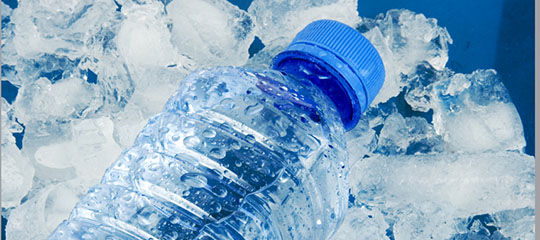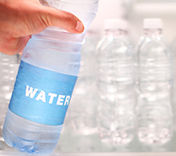
By Mark P. Kelly, Ph.D.
Though we have yet to hit the really hot (and, depending on where you live, often humid) months of the year, helping your clients stay hydrated before, during and after intense and long-duration workouts still remains a concern. This is especially true for your performance-focused clients, who are likely looking for any factor that might give them an advantage, particularly during competitions. Several new studies offer important insight into how athletes can properly hydrate to maximize performance.
Cold Water Benefits
A recent study looked at how drinking cold water affects thermoregulation and performance in three areas: endurance (bicycle time to exhaustion), strength [a 60 percent of one-repetition maximum (1RM) bench press to exhaustion] and power (a single broad jump). A randomized crossover order was used for the three performance tests on two occasions. On one trial, for example, some subjects rode the bike to exhaustion, then jumped and performed the bench press to exhaustion). Subjects included 45 men, ages 25 to 35, with an average VO2 of about 50 mL/kg/min, and average body fat of 13.7 percent. Subjects drank either cold water (39° F) or room-temperature (72° F) water in the two trials. Subjects’ core body temperatures were measured during the exercise session; those who drank cold water were able to delay their increase in core body temperature for at least 30 minutes (compared to 15 minutes for the other group). Researchers also found that drinking cold water improved performance in the broad jump among 49 percent of participants, while 51 percent improved their performance in the endurance test; however, these improvements were not considered statistically significant. Bench press performance actually went down a bit from 22.7 to 22 reps, which was considered statistically significant. The effect size calculation indicates this was only a small or negligible effect (La Fata et al., 2012).
Another study (Byrne et al., 2011) observed cyclists and how pre-cooling affected performance in high heat (90° F) and humidity (60 percent). Seven 21-year-old male recreational cyclists consumed about 30 ounces (almost 4 cups) of either cold (36° F) or warm (100° F) flavored water over a period of 35 minutes of pre-exercise rest. Among those who drank the cold water, body temperature was lower both before starting and after five to 25 minutes of activity. These subjects also cycled farther and their mean power output was greater in comparison to those who drank the warm water. Skin temperature, lactate, heart rate, perceived exertion and sweat loss, however, did not differ between the two groups.
Endurance athletes are often urged to “pre-cool” before competition. A recent report by Siegel and Laursen (2012) mentions how pre-cooling lowers core temperature, thus increasing one’s heat storage capacity, and subsequently improves exercise performance in the heat. While the exact mechanism is not known, it is suspected that brain temperature, internal thermoreception and sensory responses may be involved.
Yet another study looked at the influence of beverage temperature on the palatability or how good it tasted to the exerciser. The more palatable a drink is, the greater the likelihood that someone will consume it. In all the studies reviewed, consuming either cold (32-50° F) or cool (50-68° F) fluids during activity was preferred to drinking warm fluids. The analysis showed that participants would consume about 50 percent more fluid during exercise when given cold or cool fluids. They also found that water temperature significantly impacted subjects’ dehydration status; a 150-pound man, for example, lost about 2 pounds less fluid when consuming cold water than he would have if he had been drinking warmer water (Burdon et al, 2012).
The Bottom Line for You and Your Clients

Colder water is better for both performance gains and for keeping you and your clients going longer in hot conditions. And this applies to both before and during the exercise session, particularly for longer workouts. In an article published in Nutrition Reviews, Eric Goulet (2012) asserts that hydration strategies become even more important when endurance exercise exceeds one hour. Athletes should stay hydrated to avoid body-weight losses greater than 3 percent of starting weight, and should drink approximately 5-10 mL/kg of body weight. Previous studies have demonstrated that it only takes a 3 percent reduction in body weight for performance to be significantly decreased.
The type of fluid one uses to hydrate should be based, at least in part, on the duration of the event. The American Council on Exercise advises pre-loading with an electrolyte solution two hours before an endurance event or long-duration workout, and then switching to water immediately before starting. Be careful not to hydrate to the point of getting stomach cramps, which is often a spasm of the thoracic tendons. If the event or workout lasts less than an hour, water is all that is needed. If the event is 60 to 90 minutes in duration, then some electrolyte replacement is advised. If the event goes into the 90- to 120-minute range, electrolytes and carbohydrates should be replenished. And, if the event or workout exceeds two hours, you probably need to consider utilizing all the previously mentioned items, plus some amino acids, particularly branched-chain amino acids, especially if glycogen depletion is likely (Antonio and Stout, 2008).
So remember, to help you and your clients keep your cool during hot and heavy workouts, keep drinking cold fluids about every 15 to 20 minutes.
References
Antonio, J. and Stout, J.R. (2008). Sports Supplements. Baltimore, Md: Lippincott Williams & Wilkins.
Burdon, C. et al. (2012). Influence of beverage temperature on palatability and fluid ingestion during endurance exercise: A systematic review. International Journal of Sports Nutrition & Exercise Metabolism, 22, 3, 199-212.
Byrne, C. et al. (2011). Self-paced exercise performance in the heat after pre-exercise cold-fluid ingestion. Journal of Athletic Training, 46, 6, 592.
Goulet, E. (2012). Dehydration and endurance performance in competitive athletes. Nutrition Reviews Supplement, V70, S2, S132-S136.
LaFata, D. et al. (2012). The effect of a cold beverage during an exercise sssion combining both strength and energy systems development training on core temperature and markers of performance. Journal of the International Society of Sports Nutrition, 9, 1, 44.
Siegel, R. and Laursen, P.B. (2012). Keeping your cool: Possible mechanisms for enhanced exercise performance in the heat with internal cooling methods. Sports Medicine, 42, 2, 89-98.
_______________________________________________________
 Mark P. Kelly, Ph.D., CSCS is an exercise physiologist for the American Council on Exercise. He has been involved in exercise sciences as an author, presenter, trainer and athlete for over 25 years. He has been teaching sciences in universities, performing research, and physiological assessments in exercise science for over 20 years. He has had his scientific studies published by the ACSM, NSCA, and FASEB and currently produces workshops, webinars, books, articles, and certification manuals, to bridge the gap between science and application for trainers and the lay public.
Mark P. Kelly, Ph.D., CSCS is an exercise physiologist for the American Council on Exercise. He has been involved in exercise sciences as an author, presenter, trainer and athlete for over 25 years. He has been teaching sciences in universities, performing research, and physiological assessments in exercise science for over 20 years. He has had his scientific studies published by the ACSM, NSCA, and FASEB and currently produces workshops, webinars, books, articles, and certification manuals, to bridge the gap between science and application for trainers and the lay public.